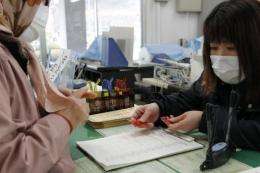Radioactivity in Europe, no public risk: IAEA

The UN atomic agency said Friday "very low levels" of radioactive iodine-131 had been detected in the air in the Czech Republic and in other countries, but presented no risk to human health.
The Czech nuclear safety office said that the source of the contamination was "most probably" outside the Czech Republic, and that its information suggested the cause was not an accident at an atomic power plant.
The International Atomic Energy Agency said it had received information from Czech authorities "that very low levels of iodine-131 have been measured in the atmosphere over the Czech Republic in recent days."
"The IAEA has learned about similar measurements in other locations across Europe," it said, without saying which other countries were affected.
"The IAEA believes the current trace levels of iodine-131 that have been measured do not pose a public health risk and are not caused by the Fukushima Daiichi nuclear accident in Japan" in March, it added.
It said it was working with its counterparts to determine the cause and origin of the iodine-131, which has a half-life of around eight days, and that it would provide further information as it becomes available.
The Czech State Office for Nuclear Safety (SUJB) said that "trace amounts" have been registered in the air in the past two weeks.
"Although the iodine content in the air does not in any way threaten people's health, the SUJB has ordered a change in the monitoring regime to get as much data as possible," it said,
"We are monitoring future developments of the situation in detail to possibly localise and identify the source which is most probably situated outside the Czech territory. The source of the contamination is not known at the moment."
It added: "We have not detected any increase in the concentration of other artificial radionuclides, which suggests the cause was not a nuclear power plant accident."
(c) 2011 AFP

















